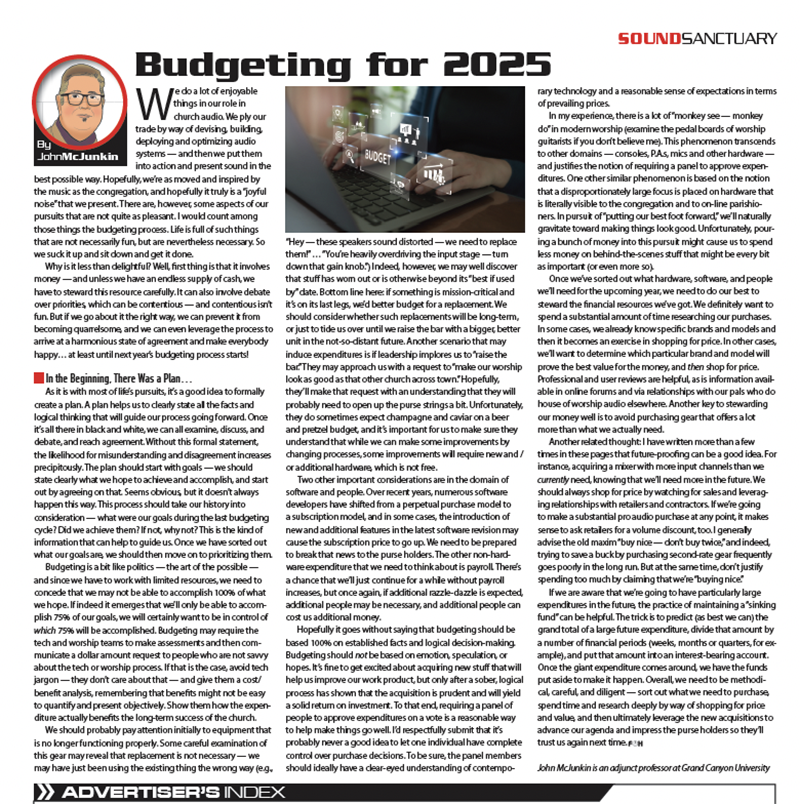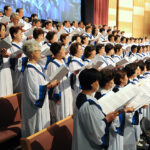In the past decade, houses of worship have undergone a transformation. Production values have gone through the roof. An entire sub-industry has popped up to service the house of worship production market. Visit any industry trade show — whether NAB or this month’s InfoComm — and you’ll see entire segments of the show floor (or seminars) devoted to house of worship production.
Unfortunately, many churches that have embraced high-quality/high-tech production have been slower to embrace the need for professional operators. This has led to quite the conundrum, where a church might have all of the right tools but no one who truly knows how to troubleshoot or operate the systems.
As more and more churches recognize the need for professional operators, it is becoming increasingly difficult to find people who are the right fit for any given congregation. The reality is that a congregant with an unrelated engineering background or a ham radio hobby just doesn’t cut it these days. Many churches, both large and small, need people who specialize in live event production.
I’ll admit that, as someone from a church where we pay our audio engineers for Sunday worship, it is easy to forget that there are many smaller churches out there who cannot afford to pay production staff but still require clear, intelligible audio for their congregation.
Volunteer Benefits
There are numerous benefits to a volunteer audio team, the most obvious of which is cost. Not having paid audio staff equates to huge annual labor savings. How much? The going rate for paid audio staff varies widely, so it’s difficult to say. On the low end, a relatively inexperienced audio engineer might cost as little as $10/hr. On the high end, a very skilled operator could cost $100 per service or even more.
In addition to the obvious cost savings, there are other, less tangible benefits of using volunteers. Cultivating a volunteer team is a great community-building exercise. I’ve been doing this long enough to watch some our youth volunteers grow up and become adults, and that has been very rewarding for me.
A strong team of volunteers is typically indicative of a strong congregation, so building a volunteer technical team can benefit a church in ways that fall outside of the technical realm.
Finally, the possibility always exists that today’s volunteer will become tomorrow’s paid staff member. One of my best paid audio engineers started with me years ago as a volunteer, and I’m sure that story is not at all unique.
The paid/unpaid decision is complex and not necessarily an easy one, but hopefully this article will help you sort out what works in your church.
Vince Lepore is the technical director at St. Luke’s United Methodist Church in Orlando and teaches live production at Full Sail University. Contact him at vlepore@fohonline.com.
Six Key Decision Points
Armed with an understanding of just how expensive paid audio staff can be, when do you to make the decision to bite the bullet and bring in a paid professional? Here are some scenarios to consider:
- Changes: If your audio setup is changing from week to week, volunteers may have a difficult time adapting and coping with the constant changes. Professional live engineers are skilled in dealing with “on the fly” changes. If you want to use volunteers regularly, try to make your setup repeatable for them so they know what they are walking into.
- Foldback: If your audio setup requires the engineer to mix FOH and monitors from the FOH position, it may be a job for a professional engineer. Focusing on a good house mix is challenging enough, especially in spaces with less-than-stellar acoustics. If you’re asking a volunteer to mix FOH and monitors at the same time, you are likely setting them up for frustration and failure. Don’t assume that a personal monitor mixing system (Aviom, etc.) is going to solve this problem either, because those systems still require the audio engineer to ensure proper sends and levels into the system.
- Poor Gain Before Feedback: How and why feedback occurs is a complicated matter. Equalization alone can’t always solve feedback, and if it does, it often equates to poor and dull sound quality once you’ve hacked all of the high-end out of your mics. Most volunteers simply won’t be equipped to understand the complicated interaction between the source, the room, the mic and the loudspeaker. Dealing with feedback issues will often require a professional.
- Mics in Front of the P.A.: Too many mics out in front of the P.A. makes quality sound difficult to achieve and contributes to feedback. If the configuration of your room requires a lot of mics in front of the main P.A., those mics will have to be carefully rung out and placed to avoid feeding back. Even the best engineers can struggle in this scenario, so imagine how difficult that will be for your volunteers.
- Poor Acoustics: A high quality sound system doesn’t always translate into high quality sound. The room, the sound system itself and the operator are all factors. Your volunteers may not have the fundamental audio knowledge to understand the complex interaction between the sound system and the room. They may not understand how mic and loudspeaker selection, placement and aiming can make or break a system’s performance in a poor acoustic environment. Poor acoustics often necessitate a professional engineer.
- The RF Issue: Sound systems with a lot of wireless require special attention. Some multichannel wireless systems seem to just work because they are located in areas with little potential for interference. Other wireless systems are plagued by dropouts or interference due to poor design, poor antenna placement, or a combination of many factors. Troubleshooting and maintaining the proper operation of a wireless system is often a job for a professional audio engineer, not a volunteer.



